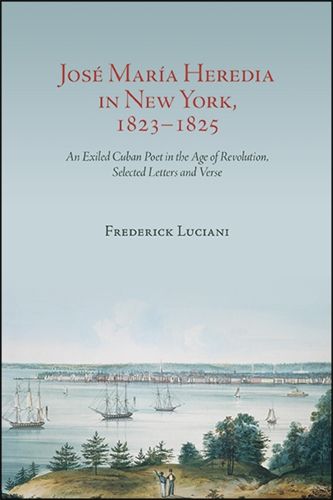Readings Newsletter
Become a Readings Member to make your shopping experience even easier.
Sign in or sign up for free!
You’re not far away from qualifying for FREE standard shipping within Australia
You’ve qualified for FREE standard shipping within Australia
The cart is loading…






This title is printed to order. This book may have been self-published. If so, we cannot guarantee the quality of the content. In the main most books will have gone through the editing process however some may not. We therefore suggest that you be aware of this before ordering this book. If in doubt check either the author or publisher’s details as we are unable to accept any returns unless they are faulty. Please contact us if you have any questions.
This volume offers the most complete English translation to date of the prose and poetry of Jose Maria Heredia (b. Cuba, 1803; d. Mexico, 1839), focusing on Heredia’s political exile in the United States from November 1823 to August 1825. Frederick Luciani’s introduction offers a complete biographical sketch that discusses the complications of Heredia’s life in exile, his conflicted political views, his significance as a travel writer and observer of life in the United States, and his reception by nineteenth-century North American writers and critics. The volume includes thoroughly annotated letters that Heredia wrote to family and friends in Cuba, describing his struggles and adventures living among other young expatriates in New York City-fellow conspirators in a failed plot to overthrow Spanish rule on the island. His travel letters, especially those that describe his trip to the Niagara frontier in 1824 along the Hudson River and the Erie Canal, offer discerning reflections on American landscapes, technological advances, political culture, and social customs. The volume also offers translations of the verse that Heredia composed during his New York exile, in which he gave impassioned voice to Cuba’s struggle for independence from Spain, and which reflected the emerging Romantic sensibilities in Spanish-language poetry. With accurate, clear translations, this volume serves as an introduction to a figure who is enshrined in the canon of Latin American literature, but scarcely known to Anglophone readers.
$9.00 standard shipping within Australia
FREE standard shipping within Australia for orders over $100.00
Express & International shipping calculated at checkout
This title is printed to order. This book may have been self-published. If so, we cannot guarantee the quality of the content. In the main most books will have gone through the editing process however some may not. We therefore suggest that you be aware of this before ordering this book. If in doubt check either the author or publisher’s details as we are unable to accept any returns unless they are faulty. Please contact us if you have any questions.
This volume offers the most complete English translation to date of the prose and poetry of Jose Maria Heredia (b. Cuba, 1803; d. Mexico, 1839), focusing on Heredia’s political exile in the United States from November 1823 to August 1825. Frederick Luciani’s introduction offers a complete biographical sketch that discusses the complications of Heredia’s life in exile, his conflicted political views, his significance as a travel writer and observer of life in the United States, and his reception by nineteenth-century North American writers and critics. The volume includes thoroughly annotated letters that Heredia wrote to family and friends in Cuba, describing his struggles and adventures living among other young expatriates in New York City-fellow conspirators in a failed plot to overthrow Spanish rule on the island. His travel letters, especially those that describe his trip to the Niagara frontier in 1824 along the Hudson River and the Erie Canal, offer discerning reflections on American landscapes, technological advances, political culture, and social customs. The volume also offers translations of the verse that Heredia composed during his New York exile, in which he gave impassioned voice to Cuba’s struggle for independence from Spain, and which reflected the emerging Romantic sensibilities in Spanish-language poetry. With accurate, clear translations, this volume serves as an introduction to a figure who is enshrined in the canon of Latin American literature, but scarcely known to Anglophone readers.